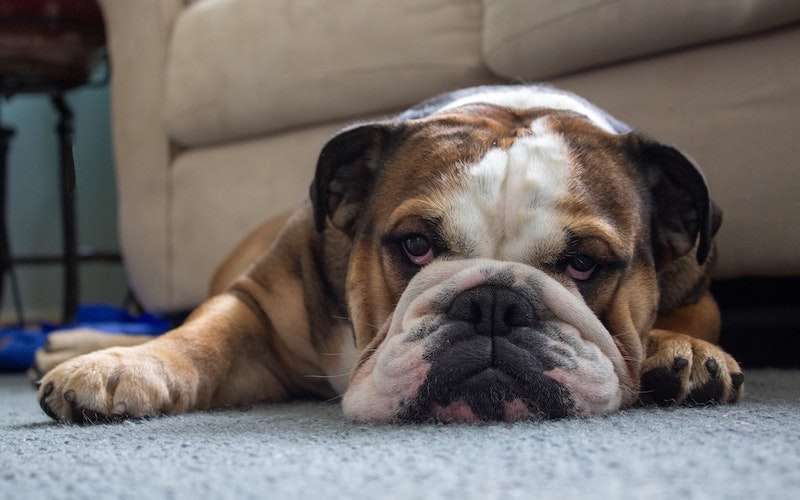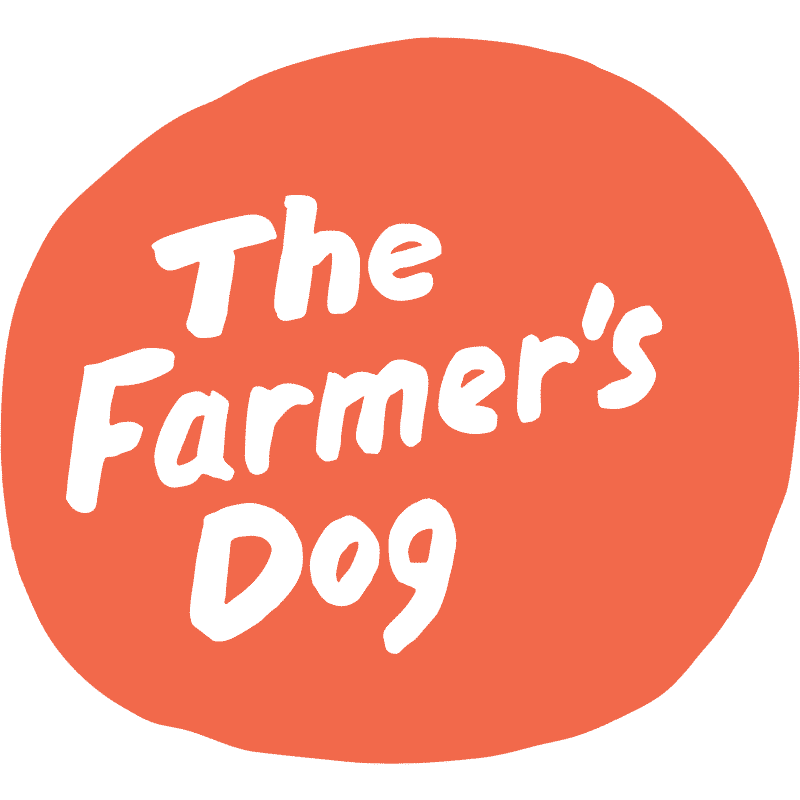The Dog Tale is reader-supported. We may earn a commission if you buy something through our site; this doesn’t change our recommendations.
All dogs will have gas at some point. It’s a normal function of their body. But what should you do when your dog has bad gas suddenly and it smells especially terrible? And how about when that awful stench is accompanied by watery, loose stools?
Sudden, stinky gas and diarrhea are an indication of trouble in your dog’s digestive tract. It’s probable that your dog’s digestive system is struggling to digest something they’ve recently eaten.
This is usually a temporary issue that will go away once the problematic food passes through the dog’s system. Other times, this combination of terrible gas and diarrhea is a red flag of a serious health issue.
This guide will help you learn how to pinpoint the cause of your dog’s sudden bad gas and avoid that trigger.
- Protect your pet in seconds
- Accident & Illness + Optional Wellness coverage available
- Policies start at just $9.99/mo
In this guide:
- Why is my dog gassy? Causes of loose stools and smelly gas
- Why do these foods produce gassiness and loose stools?
- How to treat sudden gas and diarrhea
- Is diarrhea dangerous?
- What to do if your puppy experiences sudden gas and diarrhea
- Conclusion
Why is my dog gassy? Causes of loose stools and smelly gas
Many things could suddenly cause loose stools, loud stomach sounds, and smelly gas in your dog, but food is usually to blame. If you’ve changed foods recently, it’s probably the cause of your dog’s loose stools and smelly gas.
Most cases are mild and can be treated fairly easily. But if your dog has been experiencing diarrhea, stomach upset, and smelly farts for a while, it’s a good idea to speak to a veterinarian. Ongoing digestive issues could be a sign of a more serious medical condition.
>> Read more: Lemonade Pet Insurance Review: Is It Good?
A sudden change in diet
If your dog has bad gas suddenly, ask yourself if you fed them a new food recently. One of the most common causes of diarrhea in dogs is a sudden change in diet. Did you just switch to a new brand of food? Did the dog enjoy a buffet dinner from the trash can? New dog food recipes, treats, human foods, and spoiled food can induce sudden smelly farts and soft stools.
Transition into new dog foods slowly
If you change your dog’s food too quickly, it can upset your dog’s stomach. You should transition your dog’s food gradually over a period of 7 to 10 days, and even longer if you have a dog with a sensitive stomach. Start with 80% old food and 20% new, then adjust the proportions slightly each day.
Your pet could also have a food intolerance to the recipe you’ve chosen. If the gas and diarrhea persist long after you’ve transitioned them to their new diet, one of the ingredients may not agree with the dog’s GI tract. In this case, consider working with your vet to find a food that will better suit your dog.
>> Read more: Best Dog Food for Colitis
New treats or chewy bones
Treats or other chewable ‘bones’ can often produce gas and even diarrhea. If you notice your dog produces smelly gas after eating a new treat, the cause may be the treat. The gas your dog is producing is a fetid flag telling you something about the dog’s inability to digest the food properly, so it’s best to simply stop feeding them the treats no matter how much they love them. If the gas goes away, there’s your culprit. Find a replacement that’s more digestible and agreeable to the dog’s stomach.
Single-ingredient treats are an easy way to eliminate problematic triggers. Fortunately, there are many options nowadays, like Just Food For Dogs Chicken Treats, or Davie’s Sweet Potato Dog Treats.
Feeding table foods
Too often, I find that when my dog is gassy and has diarrhea, it’s due to one of our kids feeding him table scraps. Vets usually poo poo (you’re welcome) the idea of feeding your dog table scraps as it tends not to be beneficial to your dog.
Human food tends to be higher in fat content than dog food, and some are more fibrous than dogs can tolerate. Dogs also don’t tolerate dairy or spicy food well, which is why jalapenos are bad for dogs. It’s incredibly difficult to not feed them a little bit of cheese when they give you those sweet puppy-dog eyes, but you may pay for it later. And if you habitually feed your dog fatty foods, it could eventually lead to pancreatitis.
Spoiled or toxic food
Some dogs are picky eaters while others have complete dietary indiscretion. Some will eat spoiled food if given the opportunity. Others will eat a pan full of unwatched brownies or something similarly toxic. A dog’s gastrointestinal tract will reject this food, which can result in vomiting, gas, and diarrhea. Dogs may also eat non-food items which can upset their digestive system or cause damage.
Fido not feeling well?
Get a free quote from Lemonade Pet Insurance
Policies start at $9.99 a month
Consuming a diet that’s not right for your dog
If your dog has had digestive issues for some time, their body is probably reacting to their current diet. The food may not be easy to digest, or they could have a food allergy. It may be a fine brand of food, but for whatever reason, it is not ideal for your dog.
Low-quality dog foods, particularly highly processed foods with cheap fillers, can cause these loose stools and gas. Highly processed food tends to not be as digestible as whole foods, which is why dogs will often poop more when they eat kibble than when they’re fed high-quality fresh food, such as The Farmer’s Dog. With fresh food, more of it is digested and absorbed into the body.
Dog foods that have a high amount of fiber may also produce gas. When food is not easily digested, it can ferment in the colon and produce gas and eventually loose stools.
- Fresh, human-grade dog food
- Automatic shipping, so you never have too much or too little; cancel any time
- Get 50% off your first delivery
Swallowing air
When dogs become excited at mealtime, they’ll often eat too fast. When they gobble up the food quickly, they don’t chew properly, which is the first step in digestion. Not only will the food not be chewed well, but your dog may also gulp air when swallowing. This can lead to belching and gas.
Brachycephalic breeds, such as pugs and bulldogs, have short snouts and flat faces. These breeds are prone to swallowing air and becoming gassy after eating. Usually, this gas doesn’t smell as bad as gas caused by digestive issues.
>> Read more: Pumpkin Pet Insurance Review
Other potential causes
Dogs that are obese, overweight, older, or sedentary (couch potatoes) are more likely to suffer from flatulence.
It’s possible they may have a gastrointestinal disease, such as Inflammatory Bowel Disease, Colitis, or Irritable Bowel Syndrome, which are serious digestive disorders that need to be resolved with the help of a veterinarian. There could be malabsorption or digestion issues, intestinal parasites, bacterial infections, exocrine pancreatic insufficiency (EPI), small intestinal bacterial overgrowth (SIBO), or enteritis. Consult our guide to IBD and IBS in dogs for more information.
>> Read more: Best Dog Food for IBD & IBS
Why do certain foods produce gassiness and loose stools?
Foods can be difficult for your dog to digest for various reasons. And foods affect dogs differently, so one dog may be fine while another is tooting noxious gasses.
Fatty and rich foods (greasy meat, cheese, and processed foods) and high-fiber foods (beans, soybeans, and broccoli) can leave your dog’s enzyme system unable to successfully digest these foods before the food reaches the colon. Once these foods are in the colon, they will begin to ferment, producing sudden, terrible gas.
Other symptoms may appear if the food isn’t properly digested. You may notice acid reflux, vomiting undigested food, bloating, gurgling noises, loss of appetite, and abdominal pain. Your dog’s poop may seem excessively foul and stinky, and could possibly contain undigested food. The poop may look greasy and light tan.
Veterinarian, Dr. Karen Becker, suggests that dogs don’t produce a lot of the digestive enzymes necessary to digest the food we typically give them. These enzymes are amylase (to digest carbs), lipase (to digest fats), and protease (to digest proteins). She believes that dogs’ pancreases cannot produce enough of these enzymes to properly digest the food. This leaves them not only uncomfortable but also lacking the ability to properly absorb the necessary nutrients they need from those ingredients. Without fixing this issue, some dogs could become nutrient-deprived, which can lead to a host of other issues.
How to treat sudden gas and diarrhea in dogs
Treatment is based on the diagnosis of the problem.
To understand some of the solutions, we first need to understand the foundation of how dogs are wired to eat. As I said above, Dr. Becker suggests that dogs don’t make enough digestive enzymes to eat the food we give them.
She believes dogs were designed to eat not just the meat of their prey, but often the digestive tract or gut of their prey. In consuming the gut, the dog ‘borrows’ the prey’s digestive enzymes located in the digestive tract, giving the dog additional digestive enzymes necessary to properly digest food.
Dr. Becker suggests adding a digestive enzyme supplement to the diet of dogs exhibiting symptoms of indigestion. Most dogs consume food that is highly processed, dead, and inorganic. This means the enzymes that may have been in the meat are no longer living due to the high temperatures at which canned wet food and dry kibbles are cooked. She adds that even dogs eating premium, gently cooked whole food or organic raw diets can benefit from digestive enzyme supplementation since there aren’t digestive tracts in these diets.
We’ll recommend some digestive supplements in the following section.
>> Read more: We Feed Raw Dog Food Review
Digestive Enzymes
A digestive enzyme supplement can provide the enzymes necessary for your dog to properly break down fats, carbs, and proteins, so these nutrients can be absorbed and used by the body—which is the whole point of eating food.
Ask your vet if a digestive enzyme, such as Dr. Mercola Digestive Enzyme is a good fit for your dog.
Probiotics
Probiotics provide good bacteria to the gut, which allow proper digestion and absorption. If your pooch hasn’t been eating a healthy diet (and even if he has), he could benefit from a GI-targeted probiotic USA-made 4-Leaf Rover Probiotic. A healthy gut microbiome is essential for a healthy body.
If you want to do a bit of detective work, a tool like Nom Nom’s microbiome testing kit could help you unravel some of the issues that you suspect might be happening in your dog’s gut. We tested it out and it’s super easy to use. Just swab some of your dog’s stool with the provided kit and mail it back in using the prepaid label. After a few weeks, Nom Nom will provide you with a precise and detailed report on your dog’s microbiome, as well as suggestions on how to improve it.
Nom Nom also sells two dog probiotic products, including one that specifically targets the GI tract and digestive issues. You can learn more about each of these products, as well as Nom Nom’s highly recommended human-grade fresh food, in our full Nom Nom Dog Food review.
High-quality diet
When a dog can’t easily digest food, the fiber in that food ferments in the colon and produces gas and sometimes diarrhea. Your vet may advise changing to a more digestible diet that is low in fat and insoluble fiber.
As a general rule, the more whole the food, the better the nutrition and the easier it is to digest. The better the digestion, the more your dog’s body can absorb, and so on. Research shows that good nutrition supports a healthy gut microbiome and that the microbiome plays an important role in many systems in the body, particularly the digestive system. This reasoning is why we support the idea of feeding your dog the best quality dog food you can afford. It affects their holistic health and energy levels.
Food services like The Farmer’s Dog, Nom Nom, Ollie Dog Food, and Raised Right Dog Food formulate premium dog food from whole foods, such as whole meat, organ meat, and superfoods like chicory root. Since this real, whole food is only cooked at low temperatures, it is much more digestible and rich in nutrients than kibble, which is extruded at extremely high temperatures. And even with these, it’s beneficial to give your dog a digestive enzyme as Dr. Becker advises.
In fact, one fresh dog food company, Just Food For Dogs, conducted digestibility studies on their food with a major university. To summarize the findings of their peer-reviewed study, the results showed that their meals are 40% more digestible than kibble, and the meals produced 66% less poop than premium kibble. Additionally, the meals improved specific health markers outlined in the study.
If your veterinarian has informed you about a specific, acute health issue, Just Food For Dogs’ Vet Support and prescription meals may be able to provide your dog with the right nutrition while avoiding problematic ingredients. There are 12 meals to choose from that are specifically formulated to meet the needs of complex health issues, such as IBD or Colitis. This brand also offers probiotic supplements, but no digestive enzymes that we know of.
If fresh food doesn’t fit into your budget, there are premium, dry food options like Sundays Dog Food or Spot & Tango’s UnKibble. Although I don’t know of any digestibility studies conducted on these dried foods, I would expect them to be more digestible since they are made with human-grade whole foods and don’t include the types of offending fillers cheap kibbles include.
Whatever dog food you choose, look for whole foods. Meat should always be the first ingredient, not meat meals or meat by-products. Organ meats are great for certain essential vitamins and minerals. Choose foods that avoid food powders, fillers (like corn, wheat, and soy), artificial ingredients, colors, or synthetic preservatives.
- Fresh, human-grade dog food
- Automatic shipping, so you never have too much or too little; cancel any time
- Get 50% off your first delivery
Other treatments
Veterinarians may prescribe medications to relieve the gas. According to the VCA, these may include zinc acetate, Yucca schidigera, or probiotics. They may take a stool sample.
It may be advised to feed your dog small, but more frequent meals if they eat quickly and become overly excited at mealtime. You may find a slow feeder bowl helpful as well as they require the dog to work for their food. And if you are feeding your dog fresh or wet food, a lick mat might slow them down.
Is diarrhea dangerous?
Diarrhea can be dangerous if not resolved quickly. You shouldn’t panic when you see it, since dogs commonly get diarrhea. But it is a health issue that requires attention.
Tiny dogs, such as Yorkies with diarrhea, are at risk of dehydration and hypoglycemia since they consume so few calories per day. Pay attention to puppies and senior dogs in particular, and try to keep them hydrated. Seek your vet’s help if the diarrhea is excessive, continues for an extended period of time, or if your dog won’t eat or drink.
If your dog ate fatty or spoiled food or is getting used to a new diet, they’ll probably recover quickly from a short bout of diarrhea. However, you should still keep an eye on it to ensure the diarrhea doesn’t worsen or last more than a few days.
If the diarrhea seems excessive, is accompanied by vomiting, dehydration, bloody stools, abdominal pain, lethargy, or if something just doesn’t seem right, trust your instinct and call your vet. You should also call your vet immediately if you suspect your dog ingested a foreign object or a toxic substance.
If you aren’t able to speak with your dog’s veterinarian, you can chat with one for free through Pawp.
- Unlimited consultations by video/text
- $3,000/year emergency fund + Rx discounts
- Cover up to 6 pets for just $24/month
- Try it FREE for 7 days
What to do if your puppy experiences sudden gas and diarrhea
Puppies are growing at a rapid rate, so they need constant nourishment. If your puppy begins experiencing excessive gas and diarrhea, it’s a good idea to call your vet and follow their protocol.
In the meantime, offer bland food like white rice or dog-safe chicken broth, plus lots of fresh water.
- Protect your pet in seconds
- Accident & Illness + Optional Wellness coverage available
- Policies start at just $9.99/mo
Conclusion
Although gas and occasional diarrhea are bound to happen on occasion, most prolonged issues can be eliminated by offering healthy, whole dog food and avoiding other foods like table scraps, unhealthy treats, and access to spoiled food or non-food items.
If your dog experiences chronic bad gas or loose stools, visit your vet.
Let's bark a little
Get our latest updates and articles right in your email.
We won't bark too much. Promise.
My Dog Ate a Cotton Ball! What Do I Do?




